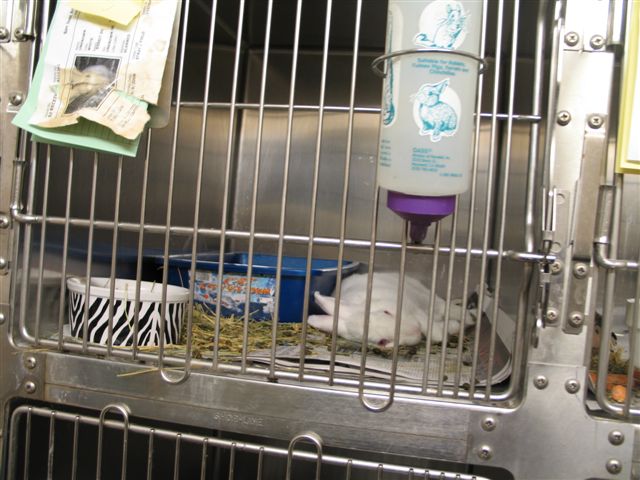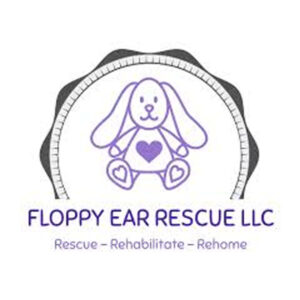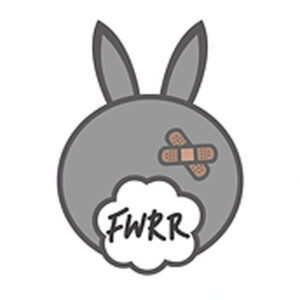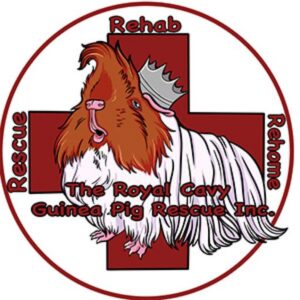Responsible Re-homing
PART I: Searching for a Solution
1a | Are you moving?
Finding a rental that allows rabbits or guinea pigs is possible if you give yourself enough time and stay flexible. Don’t give up too easily — try expanding your search area, even if it means a slightly longer commute to work or school. Sometimes, reaching out directly to landlords or leasing agents can help, too. Offering a pet deposit or agreeing to some extra rules might make them more open to allowing your pet.
If you’re moving to another state or even another country, remember that lots of people successfully move with their pets all the time. A cross-country road trip or a few hours on a plane is usually less stressful for your pet than being left behind.
Or if your housing challenge is temporary, explore options for foster care or pet boarding through a rescue. These services provide care for weeks (or even months), giving you time to find housing without giving up your pet.
1b | Don’t have enough space or time?
Many people consider surrendering their pet because they are hoping they’ll find more space or attention elsewhere.
However, your pet would rather be home alone all day and spend evenings and nights with you than end up in a shelter full of scary sounds and unfamiliar smells. In reality, they will likely end up with less space and even more limited interaction in a rescue caring for 50-100 animals at a time. Most county shelters are overcrowded and some may euthanize pets in just a week if they are not adopted. (According to the ASPCA approximately 920,000 shelter animals are euthanized each year.) Rabbits and guinea pigs, in particular, do not do well in a kennel; the stress can cause them to bite or scratch or cower in fear, leading to them being labeled “aggressive or un-adoptable” and euthanized.
Keeping your pets with you, even if space or attention is limited, usually provides them with a far safer, more stable, and compassionate environment than a shelter ever could.

1c | Experiencing behavioral issues?
Most rescues are happy to work with you to address and improve negative behaviors. The following issues are more common than you think and often have a simple solution!
- Spaying and Neutering: can greatly improve a rabbit’s behavior by reducing hormonal issues such as territorial aggression, spraying, and poor litter-box habits.
- Aggression: is often a learned behavior that can be corrected with proper training and understanding of your rabbit’s needs and what they are trying to communicate.
- Litter Training: rabbits are quick learners and often pick up litter-training in just 3-5 days. Most litter-box issues actually stem from too small or unsuitable litter-boxes which can be easily be adjusted.
- Chewing and Digging: are natural behaviors for rabbits and guinea pigs. However in excess may be a sign of boredom or frustration. By providing appropriate outlets, like chew toys and digging boxes, and ‘bunny-proofing’ their space, these behaviors can be redirected in a way that keeps your pet (and your home) safe.
1d | Financial difficulties
If you are having a tough time financially, there are resources and support networks available to help! Many communities, rescues, and online rabbit groups understand the financial strain pet care can bring and are happy to lend a hand. You might be surprised by the generosity of fellow animal lovers — many are willing to ship supplies, such as hay, pellets, litter, or even small funds to keep pets with their families. Local rescues and animal welfare organizations can also provide guidance and may have programs in place to help bridge financial gaps for pet owners in need.
By reaching out, you’re not only giving yourself time to regain stability but also ensuring that your pet remains in a familiar, loving environment. Financial challenges can feel overwhelming, but with a little support from your community, you can often keep your pet at home, reducing the stress and trauma they would experience from being surrendered.
1e | Allergies
Giving up your pet due to allergies should be the last resort, not the first option.
Many people are actually NOT allergic to their rabbit or guinea pig, but rather to their hay! Switching from Timothy to Orchard Grass hay can make a world of difference. Other remedies to help alleviate allergy symptoms are: using paper-based litter instead of straw or wood shavings, keeping your pet’s enclosure the living room rather than the bedroom, investing in air purifiers, and cleaning more frequently. As a final measure, many people opt to manage their symptoms with antihistamines rather than parting with their beloved pets.
Please exhaust every reasonable option before considering re-homing.
PART II: Setting a High Standard
2a | Charge a re-homing fee
You may be tempted to offer your pet — and their supplies — up for free to attract interest. But this will attract the wrong kind of attention! Its almost unimaginable but there are people who search for small pets being offered for free to use as reptile food or bait in dog fighting.
To keep your pet safe, never to offer a rabbit or guinea pig for free unless re-homing them to a family member, trusted friend, or reputable rescue or shelter. Setting a re-homing fee of at least $50 is strongly recommended because it acts as a natural filter, keeping away people with shady intentions and showing that potential adopters are willing to make an investment in your pet’s future.
That said, if you do find an adopter you fully trust, you can choose to waive the fee. Just remember: if someone isn’t able to pay $50 to adopt, they may also struggle to meet the ongoing costs of caring for a pet, which is around $80 to $100 per month.
2b | Spay or neuter to prevent exploitation
After charging a re-homing fee, one of the most important steps you can take to protect your pet is ensuring they are spayed or neutered. Without this, they are at risk of being exploited by breeders or used in programs like 4H, where animals are treated as commodities rather than pets and receive sub-standard care. Spaying or neutering not only prevents unwanted litters but also protects your pet from reproductive-related health issues, such as cancer.
4 out our 5 unspayed rabbits will develop reproductive cancer by age 4.
Spaying or neutering doesn’t have to break the bank — county shelters often offer low-cost spay/neuter programs that can come out to half the cost of standard veterinary services. Ask a rabbit rescue or house rabbit chapter in your state for a recommendation.
At the least, get a wellness check to confirm they’re healthy. Not only does this give you peace of mind, it also makes them more appealing to potential adopters.
Rescues are more likely to assist with re-homing by cross-posting adoption listings, or accept your pet into their program, if the animal is already spayed/neutered, vetted, and vaccinated.
2c | Don’t be afraid to ask questions
Finding the right home means carefully screening potential adopters to distinguish those who are truly prepared to care for your pet from those who may not be. Not everyone who expresses interest in a rabbit or guinea pig is ready to meet their needs. If someone isn’t willing to take the time to answer your questions or is resistant to guidance on proper supplies and setup, they may not be the right fit to ensure your pet’s well-being.
Questions to Ask:
Do you currently or have you ever had rabbits or guinea pigs?
- How many, where did they come from and how long did they have them, what happened to them (if they passed away)?
- What veterinarian do / did you use? How often do / did they go to the vet?
- Do you have pictures of them and of their set-up?
When someone says, “I’ve had rabbits (or guinea pigs) for years,” it doesn’t automatically mean they’re the best fit for your pet. While experience can be valuable, it’s important to dig deeper because the standards of care have significantly improved over the last decade. Many people who’ve kept rabbits and guinea pigs in the past may not have provided the level of care now recognized as essential. For instance, “having rabbits / guinea pigs for years” could mean keeping them in a hutch outside with little interaction to housing guinea pigs in cramped, unsuitable cages.
Ask potential adopters about the specific veterinary care they provided to their previous pets. Owners who had their rabbits or guinea pigs spayed or neutered and took them to an exotic veterinarian are more likely to have provided proper, up-to-date care. This indicates they understand the importance of their pet’s health, well-being, and emotional needs.
Sometimes, first-time owners who are eager to learn and open to learning proper care practices are better than “an expert” who is unwilling to adapt to modern standards. Here are some links you can share with first-time owners or those receptive to update their knowledge:
Rabbits
- What You NEED When You Bring Home a Rabbit
- TOP 10 MISTAKES RABBIT OWNERS MAKE
- PROS & CONS Of Having a Rabbit!
- 8 MISTAKES THAT SHORTEN YOUR RABBIT’S LIFE
www.rabbit.org – A comprehensive resource for rabbit care, including housing, diet, health, and behavior.
Guinea Pigs
- 10 Things to Know BEFORE GETTING GUINEA PIGS
- Top 10 Essential Guinea Pig Supplies for New Owners!
- 10 Products Guinea Pigs DON’T NEED!
- 10 Mistakes Guinea Pig Parents Make
www.guinealynx.info – An excellent guide for guinea pig care, covering nutrition, common illnesses, and proper handling.
What set-up and supplies are you planning to use?
Insist on photos of their setup and supplies!
These can identify red flags, such as an unsuitable housing (like cages or hutches) and harmful products (like gourmet “mixed” pellets, yogurt drops, wood shavings, water bottles, or harnesses). Take this opportunity to gently educate them about better options, like using an x-pen for housing, paper based litter and bedding and healthy brands for pellets and treats like Oxbow.
If someone is unwilling to invest in proper supplies, shows little knowledge or interest in learning about appropriate care, or seems reluctant to share photos or details about their plans, these are strong indicators of a lack of commitment and preparation. These red flags suggest they may not be ready or willing to provide the level of care your pet needs.
Are there any children in the home?
- Who will be the primary care-giver responsible for feeding, cleaning up after and socializing?
When screening potential adopters, it’s important to ask if they’re planning to get a rabbit or guinea pig for a child and expect the child to take on the responsibility of care. Rabbits and guinea pigs are misrepresented as easy, low-maintenance pets or good “starter pets” for children, but this is false. These exotic pets require a level of care, patience, and responsibility that even most teenagers and young adults struggle to handle consistently. While children may start out excited and enthusiastic, they often lose interest when faced with the reality of daily chores, such as cleaning enclosures, maintaining litter boxes, and ensuring proper feeding and socialization. When this happens, it can lead to neglect, with enclosures becoming dirty and unpleasant for both the pet and the family.
Additionally, rabbits and guinea pigs are not naturally cuddly or interactive in the way that children expect. They can bite or scratch if handled incorrectly and are easily stressed by loud noises, sudden movements, or rough handling. Earning their trust takes weeks or even months of calm, patient interaction—something most children are not naturally inclined to do. Many kids want a playful, interactive pet like a dog or cat, not one that requires sitting still and being quiet for extended periods. When the initial excitement fades, rabbits and guinea pigs often end up ignored.
It’s crucial to ensure that the primary caregiver will be a responsible adult who understands the information above.
Do you have other pets?
When re-homing a rabbit or guinea pig to a household with other pets, it’s essential to evaluate how the existing animals might interact with the new addition. Predatory pets, such as dogs, cats, reptiles, or ferrets, pose a particular risk to small prey animals like rabbits and guinea pigs. Even well-meaning, curious behavior from a predator pet can stress or injure a small animal. Here are some key considerations:
- Predator-Prey Instincts: Cats, dogs, and ferrets have natural hunting instincts. Even if they seem calm around smaller animals, sudden movements or noises can trigger a chase or attack. Rabbits and guinea pigs are highly sensitive to these instincts and can become stressed or frightened, even if the predator pet doesn’t intend harm.
- Physical Barriers and Safety: Ensure the adopter plans to keep the rabbit or guinea pig in a secure, predator-proof enclosure in a separate room where other pets cannot enter.
- Supervision During Interactions: If the adopter plans to allow interactions between pets, make sure they understand that these interactions must be closely supervised. Introductions should be gradual, and they must never leave the rabbit or guinea pig alone with a predator pet, even if they appear to get along.
- Behavioral Assessment: Ask the adopter about the temperament and training of their existing pets. For example, does the dog have a strong prey drive? Is the cat known for stalking or pouncing? A calm, well-trained pet is a better candidate for cohabitation than one with a high prey drive or unpredictable behavior.
- Stress Management: Even if there is no direct interaction, the presence of predator pets can cause ongoing stress for rabbits and guinea pigs. Stress can lead to health issues, including digestive problems or a weakened immune system. It’s important for the adopter to monitor their small pet’s behavior and provide plenty of hiding spots and a safe space to retreat.
By carefully discussing these considerations and emphasizing the importance of safety and stress management, you can help ensure the new home is a safe and suitable environment for the rabbit or guinea pig.
Do you have an exotic veterinarian in your area?
- Are you prepared to spend $500-1000 and drive 30min to an hour to take them to the vet if they are sick?
When screening potential adopters, it’s important to assess their willingness and ability to provide veterinary care. Like cats and dogs, responsible rabbit and guinea pig owners take them for annual wellness exams each year. However, unlike cats and dogs, not every veterinarian is experienced with exotic pets. This often means driving 30 minutes to an hour to a qualified exotic vet.
Rabbits and guinea pigs are also very fragile and can decline rapidly if they become ill. If they stop eating or show signs of sickness, they will need immediate medical attention, as even minor delays can be life-threatening. Treatment for emergencies or illnesses can easily range from $500 to $1,000 or more, depending on the severity of the issue.
Discuss these potential expenses with adopters to ensure they are financially prepared and understand the responsibility of caring for an exotic pet.
By asking questions and guiding adopters toward appropriate care, you can ensure your pet goes to a home where they’ll be well taken care of.
2d | Take time to find the right fit
Take the time to find the right fit for your pet. It’s important to understand that re-homing a rabbit or guinea pig to a safe, loving home may take longer than you expect. Even professional rescues, with their extensive experience, networks, and resources, typically take 2 to 6 months to find a suitable home for their animals. This process requires patience, as rushing could result in your pet ending up in an environment where their needs aren’t fully met.
Finding the right home involves carefully screening potential adopters, ensuring they are educated about the care requirements, and verifying that they have the time, resources, and commitment to provide a lifetime of proper care. While it may feel discouraging at times, remember that taking extra time to vet potential adopters is worth it to ensure your pet’s safety and happiness.
If you’re struggling to find the right home on your own, consider reaching out to reputable rescues or shelters for assistance—they can offer valuable advice or help amplify your search.
2e | Reach out to your local rescues
Find ALL the animal shelters and rescues in your state and ask if they can help with re-homing your pet. Keep in mind that most rescues operate with limited space and may have a months long wait-list. Rescues receive anywhere from 60 to 200 surrender requests per week, while only receiving 5 to 20 adoption and foster applications per month.
Additionally, your closest rescue may be 2-3 hours away, so be prepared to travel if a rescue does have an opening for your pet.
SOUTH FLORIDA

CENTRAL FLORIDA
NORTH FLORIDA
Bishop Animal Shelter SPCA
www.bishopspca.org
Collier County Domestic Animal Services
www.colliercountyfl.gov
Humane Society of Manatee County
www.humanemanatee.org
Humane Society of Naples
www.hsnaples.org
Humane Society of Tampa Bay
www.humanesocietytampa.org
SPCA of Tampa Bay
www.spcatampabay.org
Humane Society of the Treasure Coast
www.hstc1.org
Humane Society of Broward County
www.humanebroward.com
Others States
Visit RABBIT.ORG to find a rabbit rescue near you.
For guinea pigs, check out KAVEECAGE.NET and GUINEALYNX.INFO.




















